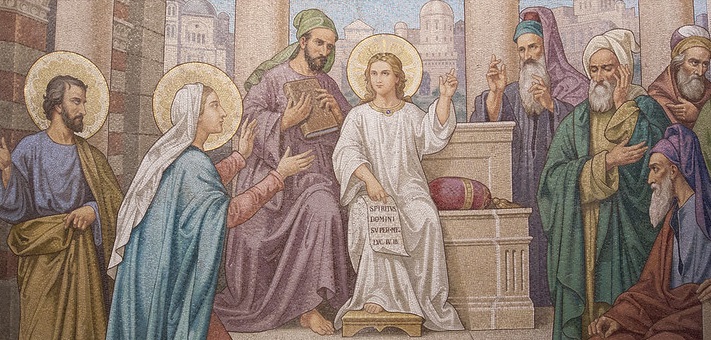Commentary on Luke 2:41-52
Even though it falls before Epiphany with its celebration of the Magi visiting Jesus in Bethlehem (Matthew 2:1–12), the Gospel readings for the First Sunday of Christmas have traditionally been drawn from stories of Jesus’ childhood (Year A: the flight to Egypt in Matthew 2:13–23; Year B: the dedication of Jesus in the temple in Luke 2:22–40; and Year C: the story of Jesus in the temple at age twelve).
The story of Jesus in the temple addresses biographical interests. Continuing from the birth narrative, this scene explores Jesus’s family of origin. We see his parents’ piety in their pilgrimage to Jerusalem for Passover (see also 2:22–24) and their care for Jesus in the anxiety and searching for him when he is not found in the group of family and friends with whom they traveled from and to Nazareth, as well as in the narrator’s closing words concerning Mary: “His mother treasured all these things in her heart” (verse 51b).
More than being about his parents, however, the story really focuses on Jesus. In a very small way, it fills something of the gap between Jesus’ birth and baptism. It shows that he was raised in the ways of Jewish piety and tradition. In spite of missing the caravan’s departure back to Nazareth, the scene characterizes Jesus as obedient (verse 51) and growing in wisdom and growing in favor (verse 52; echoing verse 40).
The scene is similar to childhood stories found in ancient biographies of philosophers and other famous figures in history and mythology. In such scenes, the behavior of the child foreshadows the protagonist’s character as an adult.
Therein lies the christological import of this scene. Jesus is twelve years old, a signal to the original audience that he is on the cusp of adulthood as defined in the ancient world (see also Mark 5:42). His actions on this occasion, then, foreshadow his ministry and especially his relationship with God.
In the birth narrative, Luke has already made it clear that Jesus is God’s son (see 1:32, 35). But here, for the first time in Luke’s narrative, near the end of his childhood, Jesus claims that relationship for himself and his sense of purpose. Jesus’ role will extend far beyond the piety in which he is raised.
The story takes the form of a pronouncement story, which is made up of a setup and pronouncement. The focus is on the pronouncement, not the set up, but the set up contextualizes how the pronouncement is to be understood. The pronouncement in this scene is found in verse 49. This is a key verse for the whole of Luke because it is the first words Jesus utters in the narrative. The pronouncement is paradigmatic for Jesus’ ministry. This is signaled not only by it being Jesus’ first speech but because it is the first occurrence of the Greek word dei (it is necessary). Then NRSV translates the word as “must” which is idiomatically fine, but Luke uses it as a code word throughout the Gospel to indicate the necessity of Jesus doing such and such to fulfill scripture and his messianic purposes (for example, 22:37; 24:7, 26, 44).
The problem is that it is terribly unclear what “it is necessary” for Jesus to do because the Greek is ambiguous. It reads “Do you not know that it is necessary for me to be en tois of my father.” Let’s start with the second word tois. It is simply the article “the” used to modify a plural noun. The problem is that Luke does not have Jesus provide a noun for the article to modify. Moreover, the article could either be grammatically neuter or masculine.
This leads us to en, a preposition that often means “in” but can be translated in English a wide range of ways depending on its object. So the phrase as a whole could mean “to be in the [house] of my father” (as indicated by the temple setting, per the NRSV; the use of the plural may be an idiom for “household”), “to be among [the people] of my father,” (referring to the teachers with whom Jesus has been speaking), or “to be about the [things] of my father” (see also the KJV, “my father’s business”).
It is worth considering whether the ambiguity is intentional. In the context of the setup, the boy Jesus is answering Mary (albeit in the form of a question) about why he was not in the caravan and why they should not have had to search for him: he is in God’s house or conversing with God’s people. But in the wider narrative beyond the pronouncement story, the answer points to Jesus accepting his messianic mission to be about God’s things even as an adolescent with wisdom yet to gain. This would be the aspect that Mary and Joseph could not understand (verse 50).
Preachers may be tempted to invite their congregation to identify with Jesus in the sense that we should accept our call in the same fashion he did. This, however, is not the best homiletical use of the text. The passage is thoroughly christological. So the preacher should offer the congregation an experience of who Jesus is by inviting them to identify with Jesus’ parents. We, like them, are looking for Jesus.
We can find him out being about the “things” of his father. What those “things” look like is found in the rest of the gospel, especially in Jesus’ first, paradigmatic sermon: “The Spirit of the Lord is upon me, because he has anointed me to bring good news to the poor. He has sent me to proclaim release to the captives and recovery of sight to the blind, to let the oppressed go free, to proclaim the year of the Lord’s favor … Today this scripture has been fulfilled in your hearing” (4:18–19, 21).


December 26, 2021